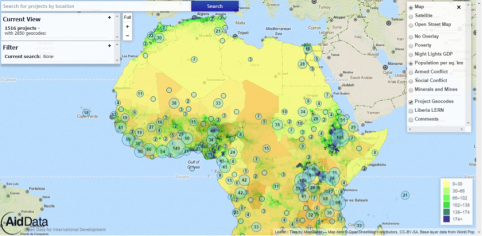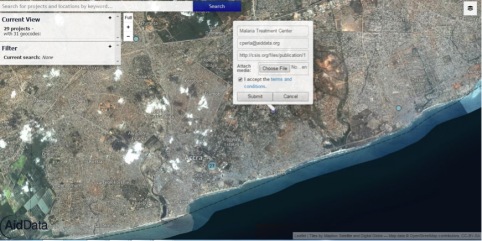
A new geospatial dashboard visualizes where China is funding development in Africa
A number of African countries view China as an attractive development partner who provides generous financing with acceptable terms and doesn’t interfere in their internal affairs. In fact, Sino-Africa relations have matured substantially since the Forum for China-Africa Cooperation (FOCAC) in 2000, reflecting growing economic, cultural, and technical cooperation.
The Chinese leadership has emphasized development cooperation with African nations in a series of summits, an action plan and eight specific measures to strengthen ties. As China continues to scale up funding for Africa’s development, the question that must be asked is: who is doing what and where?
China’s growing commitment to Africa’s development
The dramatic increase in Chinese investment to Africa in the past decade has prompted speculation by scholars, policymakers, and practitioners about China’s motivations. This guesswork has fueled suspicion that China is trying to remake Africa in its own “authoritarian capitalism” image, thereby undermining efforts to spread democracy and human rights in the region.
Academics and journalists alike have accused China of propping up irresponsible authoritarian leaders, recklessly pursuing investment without a care for the environment, and undermining “the Western order”. To substantiate their claims, they cite empirical studies purporting to objectively evaluate China’s role in Africa. In response, Chinese academics have defended China’s involvement in the region.
What these back-and-forth exchanges leave out is a crucial element in the discussion. To move beyond heated rhetoric, discussions of aid allocation and effectiveness need to be grounded in better data and an effort to listen to the voices of people on-the-ground who are directly affected by development projects. AidData hopes to move the conversation forward with a new geospatial dashboard that promises to help citizens, journalists, policymakers, and development practitioners more closely track China’s role in Africa and weigh in on the projects with which they’re familiar.

Use AidData’s dashboard to leave comments on completed and active development projects
Creating space for discussion – a dashboard offers one step forward
Launching today, AidData’s interactive geospatial dashboard features over 2000 Chinese-backed development projects in Africa, disaggregated to the provincial, municipal, or street-corner level. Leveraging the power of hyper-local information and crowdsourcing, the dashboard offers citizens, government officials, civil society leaders, journalists, and scholars a digital loudspeaker with which to: (a) comment or leave feedback on specific projects; (b) offer multimedia content to validate specific project locations; and (c) “suggest a project” in locations not currently covered by the dashboard.

Use AidData’s dashboard to upload multimedia content on Chinese-backed development projects
Our aim is to make it easier than ever before to quickly grasp where and how China is funding development activities in Africa. Not only that, but we hope that you will become part of the conversation. Visit AidData’s new geospatial dashboard today to learn more and have your say.

